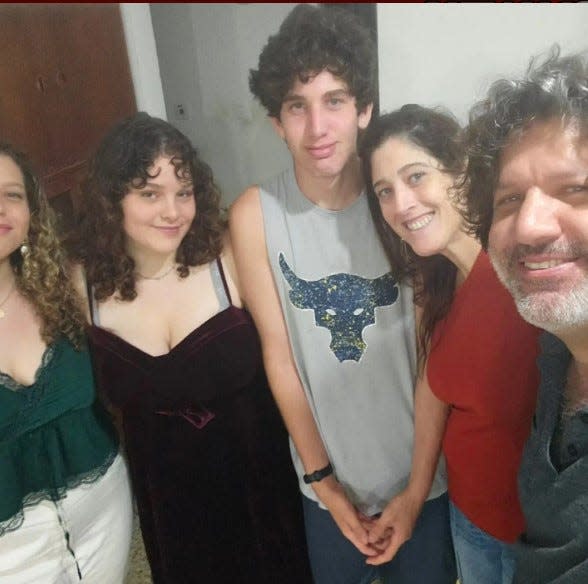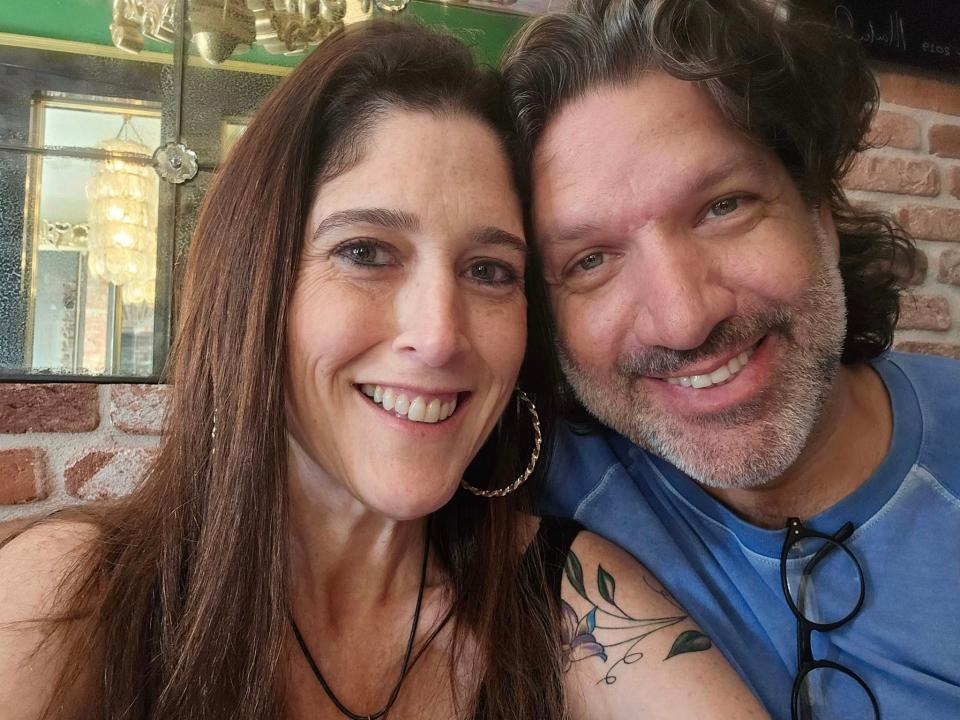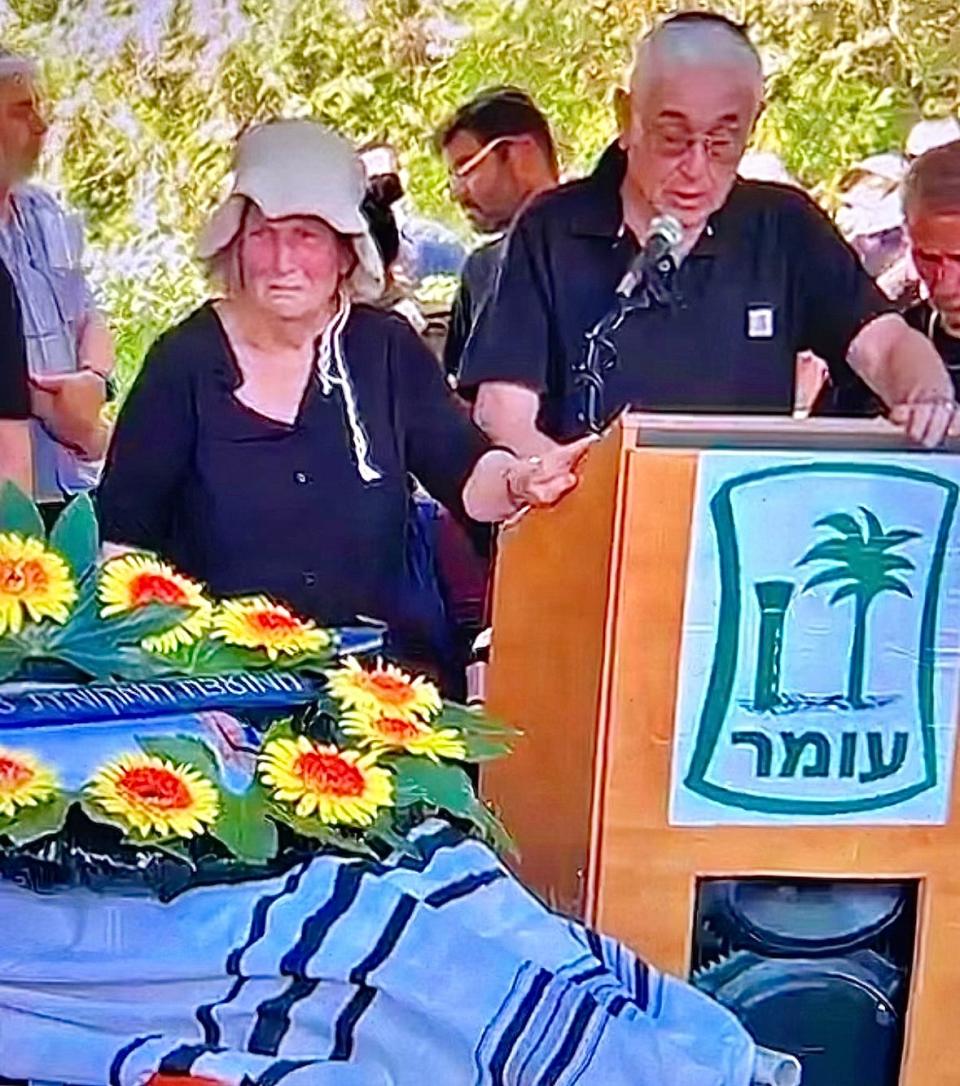His niece murdered, her son shielded beneath her body: A family's final moments in Israel
Except for a few brief Facebook messages, I hadn’t connected with my old high school friend Mike since we graduated.
But last week, something brought us to talk for more than an hour.
He sent a note saying this:
“My niece and her husband were murdered.”
They were among the massacred in Israel.
Debbie Mathias, born in the States, was 50, her husband, Shlomi, 49.
It was horrific the way they died. In her final moment, as Hamas killers broke into their safe room, Debbie lay on their 16-year-old son, Rotem, to both protect and hide him. Somehow, he survived a bullet to the abdomen that passed through his mother’s body. He then hid for 10 hours as the killers came back in the house three times to look for anyone still alive.
The family’s home – now destroyed – is in Kibbutz Holit, only a mile from the Gaza border. Debbie and Shlomi chose to live there because they were peaceniks, the kind who marched against right-wing Israeli policies on Palestinians. Shlomi taught at a mixed Arab and Jewish high school.
My friend Mike now lives in Portland, Oregon, with his wife. You may wonder why I’m only giving his first name. I’ll explain at the end of this column. It’s a shocking reason, having to do with the fear Jews feel in America today.

Mike’s murdered niece was the daughter of his older sister Carol Troen. Carol’s husband, Ilan Troen, who grew up in Boston, is a prominent Israel Studies academic both at Brandeis and at Ben Gurion University in Beersheba, not far from where the killings took place.
Only a day after the tragedy, he wrote an article about it posted by CNN. In it, Ilan said that in 1919, his own grandmother was killed in a pogrom in her Polish village of Rivne, now part of Ukraine. That, he wrote, was during a period that saw an astonishing 150,000 Jews slaughtered in horrible rampages.
“It is now my daughter who was brutally murdered,” he said.
It happened the same way and for the same reason – Jews butchered in their villages because they were Jews. Apparently, 2023 is not so different from 1919.
I remember my friend Mike well. He was a theater guy in high school. We were once in the same play together, “Dark of the Moon.” I had two lines, while he was a lead as the ancient Conjur Man. We chuckled about it on our call this week.
“They put the makeup and the face lines on me because he was about a hundred years old,” Mike said of his character. “Now when I look at myself in the mirror, I say, ‘Yeah, there he is.’”
Mike remembered a moment between us during senior year.
“I told you I just met the girl I’m going to marry,” he recalled. “You looked at me incredulous, like, ‘I can’t believe someone in my class just said that.’”
I believe it now. They waited until he graduated from NYU, but almost 50 years later, they’re still married, with four adult kids.
Early on, they lived in Israel for about a decade, Mike working in theater in the city of Haifa. In fact, when he was called up for the Lebanon war of 1982, his Army assignment was to help entertain the troops.
They returned to the States in 1984, settling near his wife’s sister in Portland, where Mike still runs his own consumer finance company.
His sister Carol and her husband, Ilan Troen – parents of Mike's murdered niece – met as graduate students at the University of Chicago, later also living in Israel for periods of time. That’s mostly where they raised their kids, including U.S.-born Debbie.
“They had six,” Mike told me. “Now they have five.”
I asked him to tell me about Debbie.
“She was very much a free spirit,” Mike said. “She and Shlomi had a special relationship, based on their love of music.”
Shlomi was a teacher and both were singers, having met at the Tel Aviv equivalent of Boston’s Berklee School of Music.
Mike found out about the murders a bit late. That’s because he is now an Orthodox Jew, shutting down electronics on the Sabbath. So, when news of the massacre began to post late on Saturday, Oct. 7, he didn’t see it.
On Sunday, he was in synagogue for the holiday of Simchat Torah. That’s when he heard others say that Israel had been attacked.
“They came across the border from Gaza,” someone told him. “Do you have anyone near there?”
Yes, his niece Debbie, but Mike felt this was a familiar case of a small border skirmish.
“I had no idea of the severity,” he told me.
He was in Chicago at the time, staying with his son, daughter-in-law and their baby. He walked back from temple into their apartment, where his wife was babysitting. She came to him sobbing.
Mike asked if Debbie and Shlomi were all right.
“They were murdered,” his wife said. “They killed them.”
The next few hours are a bit of a fog to Mike. They made calls to his two sisters in Israel, where it was 4 a.m., but of course, everyone was up. It took a day and more to get the details.
As happened in so many cases during the slaughter, Debbie and Shlomi called family in real time as the attack began. Debbie was on the phone with her dad, Ilan, as Hamas was attacking around 6:30 a.m. She told him she heard breaking glass, and men speaking Arabic. The glass was from their full-sized back door window. That’s how the killers got in. Debbie told her dad that she, her husband and her son were rushing to their safe room.

The family later learned the Hamas men used explosives to blow open the safe room door. At that moment, Debbie’s husband was on the inside holding a mattress against the door. Horrifically, the explosion tore off his arm. His son later said his last words were, “I’ve lost my arm.”
The Hamas killers didn’t seem to care about that. They came in, and as Shlomi lay helpless and grievously wounded, they shot him dead.
In the chaos and smoke, Debbie had draped herself over their son, Rotem, both to protect and hide him. The Hamas killers, at point-blank distance, shot into her body, ending her life.
One of the bullets passed through her and lodged in Rotem’s abdomen. Terrified, he lay immobile and silent. Somehow, they didn’t see him.
“You know, miracles,” Mike told me.
Young Rotem, an Israeli-American, later said the Hamas killers were laughing as they shot his parents.
Finally, they left, so Rotem hid under a blanket in the laundry room. Later, they came back and set the house on fire, which in countless other cases forced the Jews inside to run out, at which point they were shot. During World War II, the Nazis were known to do the same thing.
Over the next hours, the killers came back in the house three times to search for people to finish off. Once, Rotem heard them walking just past where he was hiding. Despite choking on smoke, and needing to cough, he put a cloth over his mouth so he could stay quiet.
As time passed, he stayed on a group text with family, as well as with a doctor friend who had Rotem take selfies of his abdominal wound and advised him on how to stop the bleeding. Another niece of Mike’s on the group chat, Bar Yuval-Shani, is a trauma psychotherapist.
“That’s a big industry in Israel,” said Mike. “She goes to where the rockets are and gives aid to people who are, I don’t know what the word is, falling apart.”
She worked hard to get Rotem through. When he grew hopeless and said he was unable to do anything to help himself, she told him that waiting is a form of action and bravery.
“They literally kept him alive,” Mike told me. “Several times he said, ‘I can’t anymore. I have to let it go.’ And they said, ‘No, you’re a hero.’”
It went like that for 10 hours. That’s because there were so many Hamas killers in the kibbutz that even when the army arrived, there was a long firefight.
From afar: His parents survived the Holocaust, now this RIer watches as a friend is attacked in Israel
“There were dozens of them,” Mike said. “They had to go from house to house.”
Rotem’s two older sisters, Shir, 21, and Shakked, 19, were a few minutes away in a kibbutz apartment. They hid for more than 12 hours, hearing screaming and explosions. At one point, the Hamas killers knocked on their door and shined a flashlight inside.
“They were just lucky,” Mike said. “Who knows?”
Even when Israeli soldiers at last got to Rotem, it took hours to evacuate him because the enemy was shooting along the region's exit routes.
Mike told me Rotem is now out of the hospital. Surgeons removed the bullet, and Rotem decided to keep it as a memory of the need to survive, and what his parents sacrificed for him. He will now be living with an uncle, who has a son around Rotem’s age.
It is Jewish tradition to bury the dead within a day or two of passing, but the funerals for Debbie and Shlomi didn’t take place for almost a week, until the day before I talked with Mike.
“They identified Shlomi’s body,” he explained, “but they hadn’t identified Debbie yet.”
I asked why.

“There are hundreds and hundreds of bodies in cold storage that were burned or mutilated,” Mike explained. High-caliber bullets, he told me, do unthinkable damage, and many of the Jewish victims were shot in the head at close range, often more than once. Some, he added were decapitated.
Michael attended the funeral by Zoom.
“The sobs and the children saying goodbye to their parents,” he told me, “and Rotem saying goodbye to his mom who saved his life – it’s such pain. I don’t think they can conceive of when that pain is ever going to go away.”
As we talked by phone, Mike paused and began speaking in the background to his wife. That brings up why I am not using his last name. His wife was asking him to leave it out.
Mike told me her mother was the only member of her family to survive the Holocaust. The mother’s siblings and other family were exterminated in Auschwitz and Buchenwald.
That knowledge has long been deep in Mike’s wife, and the slaughter in Israel has been triggering for her. She has also been frightened by pro-Palestinian rallies, where, in some cases, crowds celebrated the Hamas murders, with chants such as, “Kill the Jews.” In Chicago, where they were staying with their son, they saw police posted with automatic weapons at nearby temples.
I told him that if at all possible, it would be better to use his full name.
As he asked his wife again, I heard her start to cry in a panicky tone. It was a wrenching sound. I told Mike that of course, I would leave it out of the column.
Commentary: Jews murdered but Israel blamed? The reaction is typical; it has ever been so
“I’ve been sleeping the last few nights with a loaded gun next to my bed,” he said, “because she is deathly afraid people will come into our house and kill us.”
He added that he has some of the same concerns. He often dresses in a way that’s visibly Jewish, for example wearing an Orthodox black hat.
“I always watch for oncoming traffic,” Mike said. “Are they going to swerve and hit me, or run me over, or put a gun out of the window and shoot at me?”
I told him it’s terrible to have to worry about such things.
“That’s the world we live in,” Mike said.
He paused to again assure his wife that their last name would not be used.
But she continued sobbing.
I am sure for many reasons.
mpatinki@providencejournal.com
This article originally appeared on The Providence Journal: Israel war: Mark Patinkin shares story of friend's family loss

